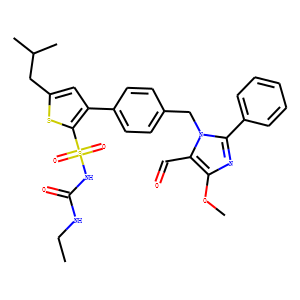| Reference | 1. Exp Physiol. 2013 Mar;98(3):850-5. doi: 10.1113/expphysiol.2012.068551. Epub 2012
Oct 5.
<br><br>
AVE 0991, a non-peptide Mas-receptor agonist, facilitates penile erection.
<br><br>
da Costa Gonçalves AC(1), Fraga-Silva RA, Leite R, Santos RA.
<br>
Author information: <br>
(1)Departamento de Fisiologia e Biofísica, Av. Antonio Carlos, 6627 – ICB – UFMG,
31270-901 – Belo Horizonte, MG, Brasil.
<br>
The renin-angiotensin system plays a crucial role in erectile function. It has
been shown that elevated levels of angiotensin II contribute to the development
of erectile dysfunction both in humans and in aminals. On the contrary, the
heptapeptide angiotensin-(1-7) appears to mediate penile erection by activation
of the Mas receptor. Recently, we have shown that the erectile function of Mas
gene-deleted mice was substantially reduced, which was associated with a marked
increase in fibrous tissue in the corpus cavernosum. We have hypothesized that
the synthetic non-peptide Mas agonist, AVE 0991, would potentiate penile erectile
function. We showed that intracavernosal injection of AVE 0991 potentiated the
erectile response of anaesthetized Wistar rats, measured as the ratio between
corpus cavernosum pressure and mean arterial pressure, upon electrical
stimulation of the major pelvic ganglion. The facilitatory effect of AVE 0991 on
erectile function was dose dependent and completely blunted by the nitric oxide
synthesis inhibitor, l-NAME. Importantly, concomitant intracavernosal infusion of
the specific Mas receptor blocker, A-779, abolished the effect of AVE 0991. We
demonstrated that AVE 0991 potentiates the penile erectile response through Mas
in an NO-dependent manner. Importantly, these results suggest that Mas agonists,
such as AVE 0991, might have significant therapeutic benefits for the treatment
of erectile dysfunction.
<br><br>
2. Cardiovasc Drug Rev. 2006 Fall-Winter;24(3-4):239-46.
<br><br>
Pharmacological effects of AVE 0991, a nonpeptide angiotensin-(1-7) receptor
agonist.
<br><br>
Santos RA(1), Ferreira AJ.
<br>
Author information: <br>
(1)Department of Physiology and Biophysics, Biological Sciences Institute,
Federal University ofMinas Gerais, Belo Horizonte, MG, Brazil.
<br>
In the last 20 years, our understanding of the physiopathology of the
renin-angiotensin system (RAS) has expanded dramatically. Basic and clinical
studies showed that this system includes several other components in addition to
renin, angiotensin (Ang) II, an-giotensin-converting enzyme (ACE), and Ang II
receptors. One of the most interesting new members of RAS is the heptapeptide
Ang-(1-7). Many in vitro and in vivo studies have proven that this peptide plays
several beneficial effects in the cardiovascular system, which are often opposite
to the effects elicited by the main component of the RAS, Ang II. In addition,
the recent discovery of the main enzyme involved in the Ang-(1-7) production,
ACE2 and the description of the Ang-(1-7) receptor Mas reinforced the biological
relevance of this peptide. These findings raised the possibility to develop new
drugs based on the ACE2-Ang-(1-7)-Mas axis and directed to cardiovascular and
-related diseases. The development of AVE 0991, a nonpeptide Ang-(1-7) receptor
Mas agonist, represents an important step for exploration of the effects of
Ang-(1-7) and testing of its potential as a cardiovascular drug. Among advantages
of this compound in comparison with Ang-(1-7) is the fact that it is orally
active and is expected to be resistant to proteolytic enzymes, circumventing an
important problem associated with the use of peptides. This article briefly
reviews in vitro and in vivo cardiovascular and renal effects of AVE 0991.
Moreover, we are pointing to the evidence that ACE2-Ang-(1-7)-Mas axis may
represent a putative target for the development of new cardiovascular drugs.
<br><br>
3. Hypertension. 2004 Oct;44(4):490-6. Epub 2004 Aug 23.
<br><br>
Nonpeptide AVE 0991 is an angiotensin-(1-7) receptor Mas agonist in the mouse
kidney.
<br><br>
Pinheiro SV(1), Simões e Silva AC, Sampaio WO, de Paula RD, Mendes EP, Bontempo
ED, Pesquero JB, Walther T, Alenina N, Bader M, Bleich M, Santos RA.
<br>
Author information: <br>
(1)Departamento de Fisiologia e Biofísica, Instituto de Ciências Biológicas,
Universidade Federal de Minas Gerais, Brazil.
<br>
It has been described recently that the nonpeptide AVE 0991 (AVE) mimics the
effects of angiotensin-(1-7) [Ang-(1-7)] in bovine endothelial cells. In this
study, we tested the possibility that AVE is an agonist of the Ang-(1-7) receptor
Mas, in vitro and in vivo. In water-loaded C57BL/6 mice, AVE (0.58 nmol/g body
weight) produced a significant reduction in urinary volume (0.06+/-0.03 mL/60 min
[n=9] versus 0.27+/-0.05 [n=9]; P<0.01), associated with an increase in urinary
osmolality. The Ang-(1-7) antagonist A-779 completely blocked the antidiuretic
effect of AVE. As observed previously for Ang-(1-7), the antidiuretic effect of
AVE after water load was blunted in Mas-knockout mice (0.37+/-0.10 mL/60 min
[n=9] versus 0.27+/-0.03 mL/60 min [n=11] AVE-treated mice). In vitro receptor
autoradiography in C57BL/6 mice showed that the specific binding of
125I-Ang-(1-7) to mouse kidney slices was displaced by AVE, whereas no effects
were observed in the binding of 125I-angiotensin II or 125I-angiotensin IV.
Furthermore, AVE displaced the binding of 125I-Ang-(1-7) in Mas-transfected
monkey kidney cells (COS) cells (IC50=4.75×10(-8) mol/L) and of
rhodamine-Ang-(1-7) in Mas-transfected Chinese hamster ovary (CHO) cells. It also
produced NO release in Mas-transfected CHO cells blocked by A-779 but not by
angiotensin II type-1 (AT1) and AT2 antagonists. Contrasting with these data, the
antidiuretic effect of AVE was totally blocked by AT2 antagonists and partially
blocked (approximately 60%) by AT1 antagonists. The binding data, the results
obtained in Mas-knockout mice and in Mas-transfected cells, show that AVE is a
Mas receptor agonist. Our data also suggest the involvement of AT2/AT1-related
mechanisms, including functional antagonism, oligomerization or cross-talk, in
the renal responses to AVE.
<br>
|

